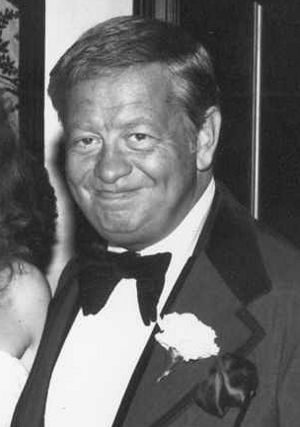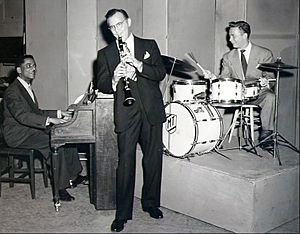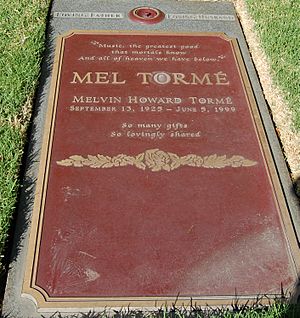Mel Tormé facts for kids
Quick facts for kids Mel Tormé |
|
|---|---|

Tormé in 1979
|
|
| Background information | |
| Birth name | Melvin Howard Tormé |
| Also known as | The Velvet Fog |
| Born | September 13, 1925 Chicago, Illinois, U.S. |
| Died | June 5, 1999 (aged 73) Los Angeles, California, U.S. |
| Genres | Jazz |
| Occupation(s) |
|
| Instruments |
|
| Years active | 1929–1996 |
| Labels | Decca, Musicraft, Capitol, Bethlehem, Columbia, Concord |
| Associated acts | Artie Shaw, Marty Paich, George Shearing |
Melvin Howard Tormé (September 13, 1925 – June 5, 1999), nicknamed "The Velvet Fog", was an American musician, singer, composer, arranger, drummer, actor, and author. He composed the music for "The Christmas Song" ("Chestnuts Roasting on an Open Fire") and co-wrote the lyrics with Bob Wells.
Contents
Early life
Melvin Howard Tormé was born in Chicago, Illinois, to William David Torme, a Jewish immigrant from Poland, and Betty Torme (née Sopkin), a New York City native. He graduated from Hyde Park High School. A child prodigy, he first performed professionally at age four with the Coon-Sanders Orchestra, singing "You're Driving Me Crazy" at Chicago's Blackhawk restaurant.
He played drums in the drum-and-bugle corps at Shakespeare Elementary School. From 1933 to 1941, he acted in the radio programs The Romance of Helen Trent and Jack Armstrong, the All-American Boy. He wrote his first song at 13. Three years later his first published song, "Lament to Love", became a hit for bandleader Harry James.
Career
Jazz music
From 1942 to 1943, he was a member of a band led by Chico Marx of the Marx Brothers. He was the singer, drummer, and also created some arrangements. In 1943, Tormé made his movie debut in Frank Sinatra's first film, the musical Higher and Higher. His appearance in the 1947 film musical Good News made him a teen idol.
In 1944, he formed the vocal quintet Mel Tormé and His Mel-Tones, modeled on Frank Sinatra and The Pied Pipers. The Mel-Tones, which included Les Baxter and Ginny O'Connor, had several hits fronting Artie Shaw's band and on their own, including Cole Porter's "What Is This Thing Called Love?" The Mel-Tones were among the first jazz-influenced vocal groups, blazing a path later followed by The Hi-Lo's, The Four Freshmen, and The Manhattan Transfer.
Tormé was discharged from the United States Army in 1946, and soon returned to a life of radio, television, movies, and music. In 1947, he started a solo singing career. His appearances at New York's Copacabana led local disc jockey Fred Robbins to give him the nickname "The Velvet Fog" in honor of his high tenor and smooth vocal style. Tormé detested the nickname. He self-deprecatingly referred to it as "this Velvet Frog voice". As a solo singer, he recorded several romantic hits for Decca and with the Artie Shaw Orchestra for Musicraft (1946–1948). In 1949, he moved to Capitol, where his first record, "Careless Hands", became his only number-one hit. His versions of "Again" and "Blue Moon" became signature songs. His composition California Suite, prompted by Gordon Jenkins's "Manhattan Tower", became Capitol's first 12-inch LP album. Around this time, he helped pioneer cool jazz.
He had a radio program, Mel Torme Time, which appeared on the short-lived Progressive Broadcasting System in the 1950s.
From 1955 to 1957, he recorded seven vocal jazz albums for Red Clyde's Bethlehem Records, all with groups led by Marty Paich, most notably Mel Tormé and the Marty Paich Dek-Tette. He became known for his arranging skills, earning the respect of musicians.
Though he spent most of his career singing jazz, Tormé had a deep appreciation for classical music, especially that of Frederick Delius and Percy Grainger. Rock and roll he considered "three-chord manure".
In the 1960s and '70s, Tormé covered pop tunes of the day, never staying long with one label. He had two minor hits: his 1956 recording of "Mountain Greenery", which did better in the United Kingdom where it reached No. 4; and his 1962 R&B song "Comin' Home Baby", arranged by Claus Ogerman, which reached No. 13 in the UK. The latter recording led the jazz and gospel singer Ethel Waters to say that "Tormé is the only white man who sings with the soul of a black man." "Comin' Home Baby" was later covered by Quincy Jones and Kai Winding.
Television
In 1960, Tormé appeared in the TV crime drama Dan Raven with Don Dubbins. He had a role in a cross-cultural western entitled Walk Like a Dragon, starring Jack Lord. He played "The Deacon", a bible-quoting gunfighter who protects a female saloon-owner and teaches a young Chinese man the art of the fast draw. Like Sammy Davis Jr. and Robert Fuller, Tormé was a real-life fast-draw expert. He also sang the show's theme song.
In 1963–1964, Tormé wrote songs and arrangements for The Judy Garland Show, where he made three guest appearances. When he and Garland had a dispute, he was fired. A few years later, after Garland's death, his time with her show became the subject of his first book, The Other Side of the Rainbow with Judy Garland on the Dawn Patrol (1970). Although the book was praised, some felt it painted an excessively unflattering picture of Garland and that Tormé had exaggerated his contributions to the program; it led to an unsuccessful lawsuit by Garland's family.
In 1967, he appeared with Lucille Ball in a two-part episode of The Lucy Show — "Main Street U.S.A." — as Mel Tinker, a songwriter who hopes to preserve the character of his small town. Torme also wrote the song that gave the episode its title, and performs it with Ball.
Tormé made nine guest appearances as himself (and one as a guardian angel) on the 1980s situation comedy Night Court. The main character, Judge Harry Stone, played by Harry Anderson, was depicted as an unabashed Tormé fan, an admiration that Anderson shared in real-life; he would deliver the eulogy at Tormé's funeral. Tormé appeared in Mountain Dew commercials and in a 1995 episode of the sitcom Seinfeld ("The Jimmy") as himself. He recorded a version of Nat King Cole's "Straighten Up and Fly Right" with his son, singer Steve March-Tormé. He worked with his other son, television writer-producer Tracy Tormé, on Sliders. The 1996 episode, entitled "Greatfellas," featured Tormé as a version of himself from a parallel universe in which he is a country music singer who is also an FBI informant.
In the 1988 Warner Bros. cartoon The Night of the Living Duck, Daffy Duck has to sing in front of several monsters but lacks a good singing voice, so he inhales a substance called "Eau de Tormé" and sings like Mel Tormé, who provided the vocals.
On December 31, 1988, Torme hosted a two-hour variety show titled Happy New Year, U. S. A. on PBS television.
Resurgence
The resurgence of vocal jazz in the 1970s resulted in a successful period for Tormé. His live performances restored his reputation as a jazz singer. He performed as often as 200 times a year in venues all over the world. In 1976, he won an Edison Award (the Dutch equivalent of the Grammy) for best male singer, and a DownBeat award for best male jazz singer. For several years, his appearances at Michael's Pub on the Upper East Side would unofficially open New York's fall cabaret season.
During the 1980s and 1990s he performed often with George Shearing, recording six albums together for Concord Records.
He reunited with Marty Paich for a tour and the albums Mel Tormé and the Marty Paich Dektette – In Concert Tokyo and Mel Tormé and the Marty Paich Dektette – Reunion. He performed with Rob McConnell's big band and recorded Mel Tormé, Rob McConnell and the Boss Brass. In 1995 he toured with Ken Peplowski. For much of the later period of his career, Mel's trio was composed of John Colianni, piano; John Leitham, bass;, and Donny Osborne, drums. With this group, Torme recorded 6 albums and toured internationally. In some instances, Mel and this group were joined by Doc Severinsen and his Orchestra, Maureen McGovern, and Cleo Laine/John Dankworth, and guest conductors on symphonic gigs included Bob Krogstad and Keith Lockhart.
Tormé made a guest vocal appearance on the 1983 album Born to Laugh at Tornadoes by the progressive pop band Was (Not Was).
In 1991 Tormé published Traps, the Drum Wonder, a biography of drummer Buddy Rich, who was his friend since Rich left the Marines in 1944. He also owned and played a drum set that drummer Gene Krupa used for many years. George Spink, treasurer of the Jazz Institute of Chicago from 1978 to 1981, recalled that Tormé played this drum set at the 1979 Chicago Jazz Festival with Benny Goodman on "Sing, Sing, Sing".
Writing, songwriting and recordings
Tormé's books include The Other Side of the Rainbow (1970), a memoir of his time as musical adviser for Judy Garland's television show; Traps, the Drum Wonder (1991), a biography of Buddy Rich; My Singing Teachers: Reflections on Singing Popular Music (1994); Wynner (1978) a novel; and It Wasn't All Velvet (1988), his autobiography.
Tormé wrote more than 250 songs, several of which became standards. He often wrote the arrangements for the songs he sang. He collaborated with Bob Wells on his most popular composition, "The Christmas Song" (1946); they wrote the song on a swelteringly hot and sunny day in California, sitting down and coming up with all the most 'mid-wintery' things they could think of, in an attempt to cool themselves down; it was recorded first by Nat King Cole. Tormé said that he wrote the music in 45 minutes and that it was not one of his favorites, calling it "my annuity".
Personal life
Mel Tormé was married four times. His first three marriages ended in divorce. He was survived by his wife, Ali; five children, Steve March-Tormé, Melissa Torme-March and Tracy, Daisy and James Tormé; and two stepchildren, Carrie Tormé and Kurt. Tracy is a screenwriter and producer. James Tormé is a jazz vocalist based in Los Angeles, California. Steve March-Tormé is also a musician and lives and works in Appleton, Wisconsin.
Illness and death
On August 8, 1996, a stroke ended Tormé's 65-year singing career. In February 1999, he was awarded the Grammy Lifetime Achievement Award. He died from another stroke on June 5, 1999, at the age of 73. He is buried at the Westwood Village Memorial Park Cemetery in Los Angeles.
Films
- Higher and Higher (1943)
- Ghost Catchers (1944)
- Pardon My Rhythm (1944)
- Resisting Enemy Interrogation (1944) (documentary)
- Let's Go Steady (1945)
- Junior Miss (1945)
- The Crimson Canary (1945) (drums dubber)
- Night and Day (1946) (drummer at rehearsal)
- Janie Gets Married (1946)
- Good News (1947)
- Words and Music (1948)
- Duchess of Idaho (1950)
- The Fearmakers (1958)
- The Big Operator (1959)
- Girls Town (1959)
- Walk Like a Dragon (1960)
- The Private Lives of Adam and Eve (1960)
- The Patsy (1964) (Cameo)
- A Man Called Adam (1966) (Cameo)
- Land of No Return (1978)
- Artie Shaw: Time Is All You've Got (1985) (documentary)
- The Night of the Living Duck (1988) (short subject) (voice)
- Daffy Duck's Quackbusters (1988) (voice)
- The Naked Gun 2½: The Smell of Fear (1991) (Cameo)
Television
The Carol Burnett Show Season 5 Episode 9 November 17,1971
- The Mel Tormé Show (1951–1952)
- TV's Top Tunes (host in 1951)
- Faye Emerson's Wonderful Town (1 episode, 1952)
- Summertime U.S.A. (1953)
- The Nat King Cole Show (July 9, 1957)
- The Comedian (1957) (written by Rod Serling, directed by John Frankenheimer)
- Playhouse 90, as Lester Hogarth in "The Comedian" (1957)
- The Pat Boone Chevy Showroom (January 7, 1960)
- U.S. Marshal, as Johnny Fleck in "The Man Who Lived Twice" (1960)
- Judy Garland Christmas Special (1963)
- To Tell the Truth (panelist, 1964)
- The Lucy Show as Mel Tinker (3 episodes, 1965–1967)
- The Sammy Davis Jr. Show (March 11, 1966)
- Run for Your Life, with Ben Gazzarra (episode writer)
- You Don't Say! (guest, 1967)
- The Virginian (special guest, episode writer, 1968)
- The Bold Ones: The Lawyers - episode "The Crowd Pleaser" (November 2, 1969)
- It Was a Very Good Year (1971) (Summer replacement series)
- Chase, as Cyclops in "$35 Will Fly You to the Moon" (1974)
- The Merv Griffin Show (3 guest appearances, 1976–1979)
- The Christmas Songs (1979) (Host, Performer) (PBS Christmas variety show)
- Pray TV (1982) (Cameo)
- Hotel (1983) (pilot for series) (Cameo)
- Night Court (10 guest appearances 1986–1992, most as himself)
- A Spinal Tap Reunion: The 25th Anniversary London Sell-Out (1992)
- Pops Goes the Fourth (1995)
- Seinfeld – "The Jimmy" (1995)
- Sliders – "Greatfellas" (1996)
- Happy New Year, U. S. A. December 31 PBS
Family
Children and stepchildren:
- Steve March-Tormé (b. 1953), singer-songwriter
- Melissa Torme-March (b. 1955), actress
- Tracy Tormé (b. 1959), screenwriter and film producer
- Daisy Tormé (b. 1969), singer, actress, broadcaster
- James Tormé (b. 1973), singer
See also
 In Spanish: Mel Tormé para niños
In Spanish: Mel Tormé para niños



